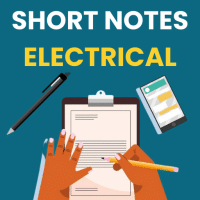Electrical Engineering (EE) Exam > Electrical Engineering (EE) Questions > When is tanφ positive?a)When inductive re...
Start Learning for Free
When is tanφ positive?
- a)When inductive reactance is greater than capacitive reactance
- b)When inductive reactance is less than capacitive reactance
- c)When inductive reactance is equal to capacitive reactance
- d)When inductive reactance is zero
Correct answer is option 'A'. Can you explain this answer?
Most Upvoted Answer
When is tanφ positive?a)When inductive reactance is greater than c...
tanφ is positive when inductive reactance is greater than capacitive reactance because current will lag the voltage.
Free Test
FREE
| Start Free Test |
Community Answer
When is tanφ positive?a)When inductive reactance is greater than c...
Tan0 depends on the value of Xl-Xc /R . if induftuve reactance is more tan0 is positive

|
Explore Courses for Electrical Engineering (EE) exam
|

|
Question Description
When is tanφ positive?a)When inductive reactance is greater than capacitive reactanceb)When inductive reactance is less than capacitive reactancec)When inductive reactance is equal to capacitive reactanced)When inductive reactance is zeroCorrect answer is option 'A'. Can you explain this answer? for Electrical Engineering (EE) 2025 is part of Electrical Engineering (EE) preparation. The Question and answers have been prepared according to the Electrical Engineering (EE) exam syllabus. Information about When is tanφ positive?a)When inductive reactance is greater than capacitive reactanceb)When inductive reactance is less than capacitive reactancec)When inductive reactance is equal to capacitive reactanced)When inductive reactance is zeroCorrect answer is option 'A'. Can you explain this answer? covers all topics & solutions for Electrical Engineering (EE) 2025 Exam. Find important definitions, questions, meanings, examples, exercises and tests below for When is tanφ positive?a)When inductive reactance is greater than capacitive reactanceb)When inductive reactance is less than capacitive reactancec)When inductive reactance is equal to capacitive reactanced)When inductive reactance is zeroCorrect answer is option 'A'. Can you explain this answer?.
When is tanφ positive?a)When inductive reactance is greater than capacitive reactanceb)When inductive reactance is less than capacitive reactancec)When inductive reactance is equal to capacitive reactanced)When inductive reactance is zeroCorrect answer is option 'A'. Can you explain this answer? for Electrical Engineering (EE) 2025 is part of Electrical Engineering (EE) preparation. The Question and answers have been prepared according to the Electrical Engineering (EE) exam syllabus. Information about When is tanφ positive?a)When inductive reactance is greater than capacitive reactanceb)When inductive reactance is less than capacitive reactancec)When inductive reactance is equal to capacitive reactanced)When inductive reactance is zeroCorrect answer is option 'A'. Can you explain this answer? covers all topics & solutions for Electrical Engineering (EE) 2025 Exam. Find important definitions, questions, meanings, examples, exercises and tests below for When is tanφ positive?a)When inductive reactance is greater than capacitive reactanceb)When inductive reactance is less than capacitive reactancec)When inductive reactance is equal to capacitive reactanced)When inductive reactance is zeroCorrect answer is option 'A'. Can you explain this answer?.
Solutions for When is tanφ positive?a)When inductive reactance is greater than capacitive reactanceb)When inductive reactance is less than capacitive reactancec)When inductive reactance is equal to capacitive reactanced)When inductive reactance is zeroCorrect answer is option 'A'. Can you explain this answer? in English & in Hindi are available as part of our courses for Electrical Engineering (EE).
Download more important topics, notes, lectures and mock test series for Electrical Engineering (EE) Exam by signing up for free.
Here you can find the meaning of When is tanφ positive?a)When inductive reactance is greater than capacitive reactanceb)When inductive reactance is less than capacitive reactancec)When inductive reactance is equal to capacitive reactanced)When inductive reactance is zeroCorrect answer is option 'A'. Can you explain this answer? defined & explained in the simplest way possible. Besides giving the explanation of
When is tanφ positive?a)When inductive reactance is greater than capacitive reactanceb)When inductive reactance is less than capacitive reactancec)When inductive reactance is equal to capacitive reactanced)When inductive reactance is zeroCorrect answer is option 'A'. Can you explain this answer?, a detailed solution for When is tanφ positive?a)When inductive reactance is greater than capacitive reactanceb)When inductive reactance is less than capacitive reactancec)When inductive reactance is equal to capacitive reactanced)When inductive reactance is zeroCorrect answer is option 'A'. Can you explain this answer? has been provided alongside types of When is tanφ positive?a)When inductive reactance is greater than capacitive reactanceb)When inductive reactance is less than capacitive reactancec)When inductive reactance is equal to capacitive reactanced)When inductive reactance is zeroCorrect answer is option 'A'. Can you explain this answer? theory, EduRev gives you an
ample number of questions to practice When is tanφ positive?a)When inductive reactance is greater than capacitive reactanceb)When inductive reactance is less than capacitive reactancec)When inductive reactance is equal to capacitive reactanced)When inductive reactance is zeroCorrect answer is option 'A'. Can you explain this answer? tests, examples and also practice Electrical Engineering (EE) tests.

|
Explore Courses for Electrical Engineering (EE) exam
|

|
Signup for Free!
Signup to see your scores go up within 7 days! Learn & Practice with 1000+ FREE Notes, Videos & Tests.























